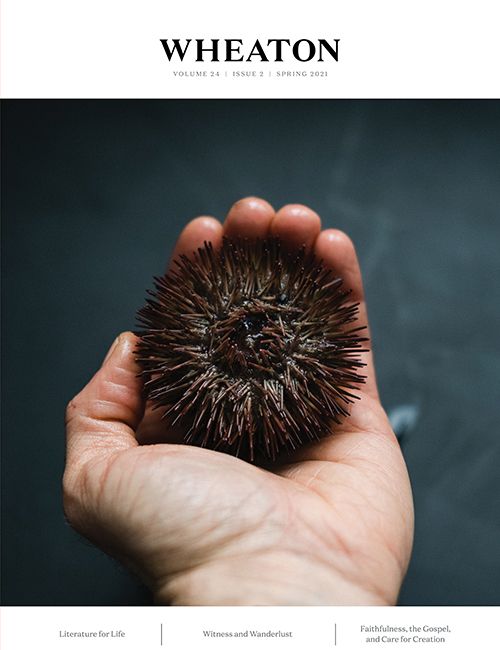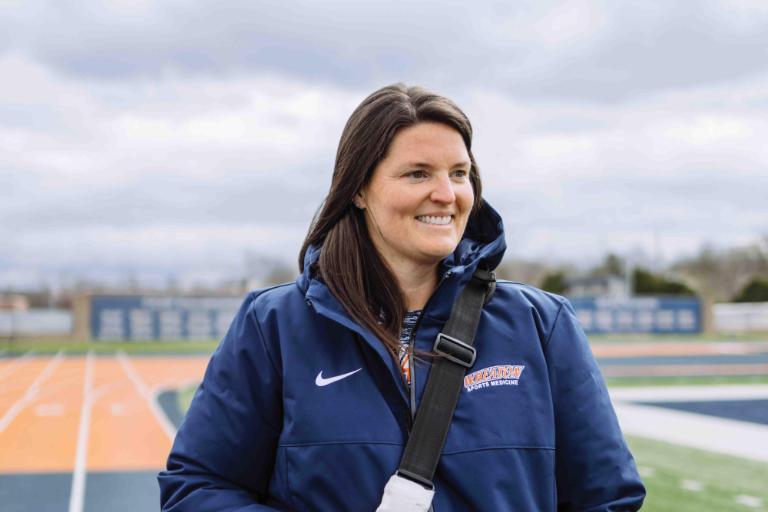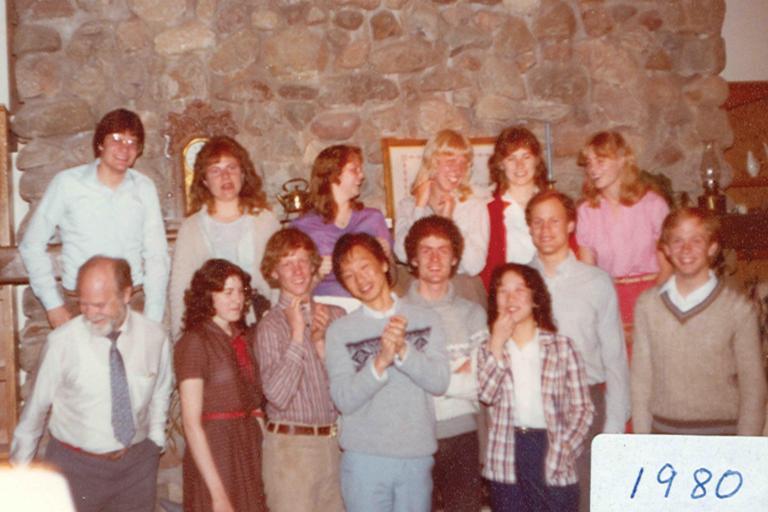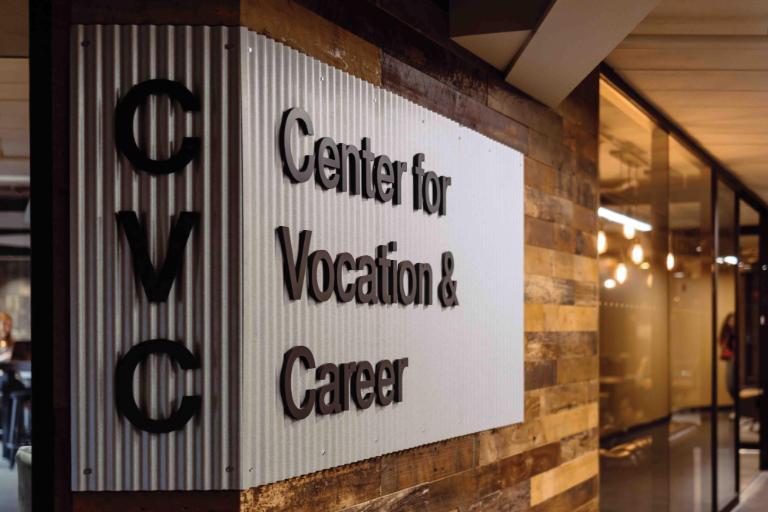Literature for Life
How Reading Shapes Our Worlds
Words: Eliana Chow ’21
Photos: Tony Hughes
Narrative shapes personal and group identity. The stories of those who have gone before us challenge us with new perspectives, expand our intellect, invite us into spaces where we didn’t think we were welcome, and make us feel less alone in our own experiences and wrestlings. And when faith is woven into the very fabric of our lives, reading becomes an avenue to discover more of God. Whether through the imago Dei of another’s experience, the artistic wonder of a poem, or a scientific description of creation’s complexity, the art of reading helps us to stop and listen, to seek beauty, and to meditate on truth.
If one takes such a high view of reading, a worthwhile question might be: “What book (besides the Bible) has changed my life?” Recently, 40 individuals from around Wheaton’s campus offered an answer, and their responses are collected here.
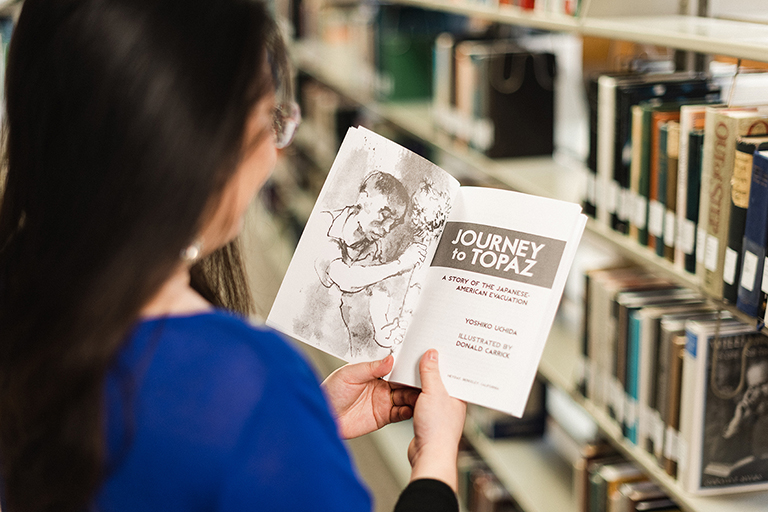 Journey to Topaz by Yoshiko Uchida
Journey to Topaz by Yoshiko Uchida
When I was a girl, I read this young adult novel and learned about the detrimental effects of the internment of Japanese Americans during World War II. It was the first book I’d ever read that featured a Japanese narrator—an Asian American girl like me. I was shocked to learn about this aspect of American history, and it opened my eyes to the reality of entire histories that are neglected by our textbooks. Our destinies crossed when I embarked on graduate studies at Berkeley, where Yoshiko Uchida once lived, studied, and attended church, too. She was a formative presence in my literary and historical imagination.
Dr. Karen An-Hwei Lee, Provost
The Art of Divine Contentment by Thomas Watson
I have often told my students that the word I want written on my gravestone is “grateful.” Watson’s book is one I have returned to many times over the years as a guidebook for contentment within our troubles.
Dan Haase ’97, M.A. ’02, Associate Lecturer of Christian Formation and Ministry
Anne of Green Gables by L.M. Montgomery
As a 10 year-old girl, that book captured my imagination and was the beginning of my love of books and reading. It inspired me to want to be an author someday, and that desire fueled my decisions as a college student and my subsequent decision to pursue a master’s degree. While I was getting my master’s degree, God directed me to my vocation of teaching at the undergraduate level, which led to completing my Ph.D. in communication. In addition, I still love reading books and have spent more hours reading to my children daily than I can possibly count.
Dr. Rebecca Border Sietman, Assistant Professor of Communication & Director of Forensics
Strength to Love by Martin Luther King Jr.
Reading this book of Dr. King’s sermons showed me how much Dr. King was guided by truly biblical, Christian principles, and that Christian principles can provide the foundation for an active political philosophy. It has inspired me to further seek after a fully Christian politics and to not accept that politics is too complicated or too “dirty” for Christian principles. Most especially, reading this showed me that love can be the foundation for a Christian politics, including and especially a love for your enemies.
Dr. Michael McKoy, Assistant Professor of Politics and International Relations
Confessions by Augustine
I decided to read the North African Bishop’s Confessions after hearing a college professor read this line: “Lord, give me chastity—just not yet.” I remember thinking, “Wow, I’ve never heard a Christian theologian say something like that! What else does he say in that book?” Sifting through the pages of this fourth-century text, I felt as if Augustine knew me, as if he was writing for me. Here was a fellow mestizo—someone whose parents are of two radically different cultures—struggling to survive in an Empire that belittled his Berber heritage, and pressured him to assimilate. Here was someone else who wanted life-giving intellectual answers to painful questions about evil, including the evils of conquest and colonialism. Here was someone who ran from God, too. Here was someone excavating Scripture and philosophy. And here was someone who ultimately came to love God and the Church. Witnessing Augustine’s journey to and with God changed me; I saw afresh that God could be for me.
Dr. Nathan Cartagena, Assistant Professor of Philosophy
Piers Plowman by William Langland
I first read it in graduate school and it has been with me ever since, through many re-readings. It changed my life because it made me ask how a Christian might do good work in the world, and not to accept platitudes as answers.
Dr. Benjamin Weber, Assistant Professor of English
Rose by Li-Young Lee
When my English professor gave me this book, I felt like I was reading the words of an older doppelganger of myself. It gave me a window into possibilities I did not know existed: Asian American poetry!
Dr. David Cho, Director of the Office of Multicultural Development
The Origins and History of Consciousness by Erich Neumann
A recent trend in Ancient Near Eastern archaeology posits that the suppression of the Ancient Near Eastern goddess Asherah in the Old Testament (e.g., Deuteronomy 16:21) was an unnecessary and even violent suppression of authentic female spirituality. While there are a variety of ways to object to this characterization, the Jewish psychologist Erich Neumann, one of Carl Jung’s most brilliant disciples, shows that worship of violent and bloodthirsty goddesses like Asherah was a psychological disaster, and therefore to promote her today is not even remotely a compliment to women. It is thrilling to watch Neumann make this case across the history of art decades before Asherah’s more recent fans emerged. Neumann’s tour de force caused me, as a Christian, to trust in the wisdom of the traditional biblical narrative, and to look with fresh wonder at the miracle of the Incarnation, which does not posit a mother goddess but something far more daring: namely, that God himself would have a mother!
Dr. Matthew Milliner ’98, Associate Professor of Art History
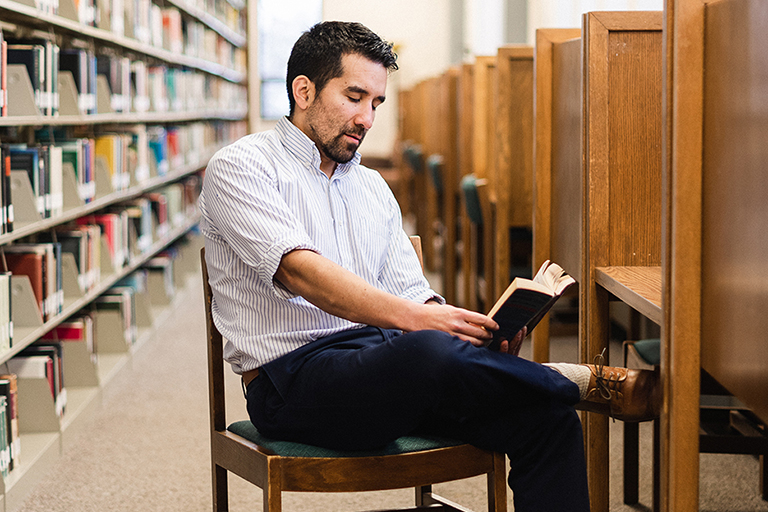 Ender’s Game (series) by Orson Scott Card
Ender’s Game (series) by Orson Scott Card
I felt like an outcast growing up and identified with many of the themes in the books. That said, Ender loves supremely and sacrificially and often his actions result in flourishing. That was inspirational at a time when I had pretty poor self-image. Ender also thinks very rationally about decisions, even moral decisions. I’m inclined to do the same; it’s probably why I’m an economist. Yet in the books he values relationship and love above perhaps anything else. It was helpful growing up to realize that you could do both.
Dr. Enoch Hill ’05, Assistant Professor of Economics
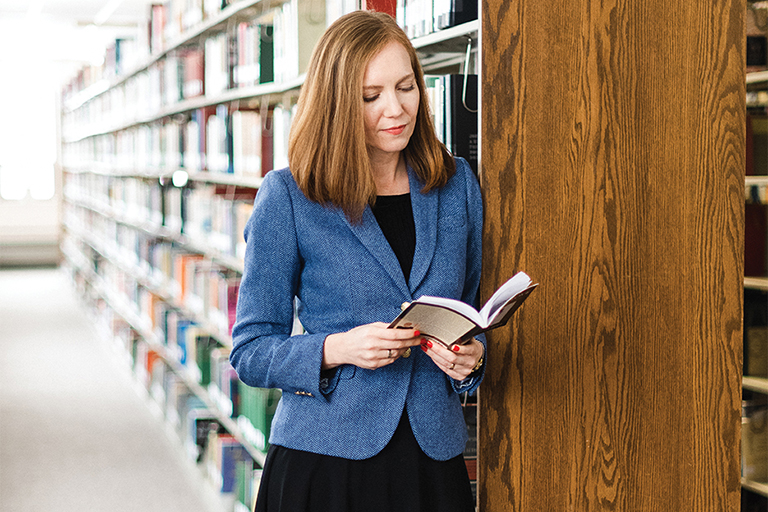 The Way of Trust and Love: A Retreat Guided by St. Thérèse of Lisieux by Jacques Philippe
The Way of Trust and Love: A Retreat Guided by St. Thérèse of Lisieux by Jacques Philippe
This little book is only 140 pages, and I have marked up nearly every page. Thérèse was a poor, young woman in 19th-century France who embraced a life of trust in God and devotion to him that has had a tremendous impact on my own spiritual practices.
Dr. Sarah Miglio M.A. ’04, Assistant Provost for Academic Affairs, Assistant Professor of Core Studies and History
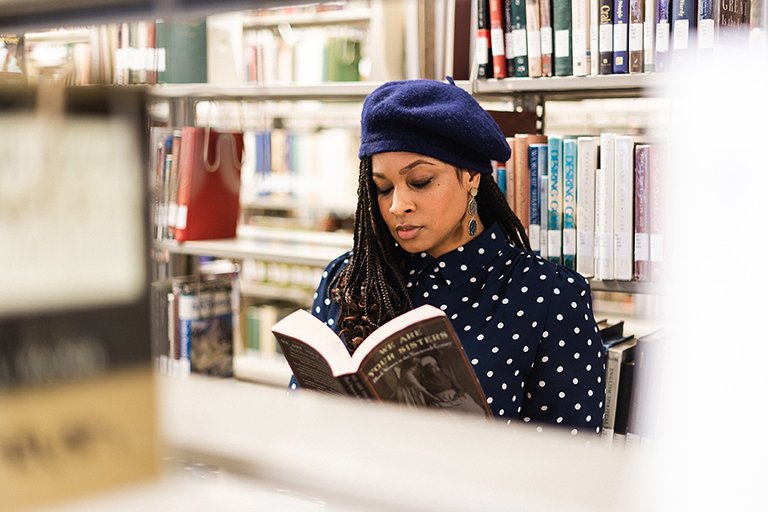 We Are Your Sisters: Black Women in the 19th Century by Dorothy Sterling
We Are Your Sisters: Black Women in the 19th Century by Dorothy Sterling
Black women’s stories are often omitted from the American history curriculum, yet Black women have made significant contributions to this country. We possess stories that should be told. As a Black woman, I have been inspired to carry on the legacy of the Black women who made possible the opportunities I have today. In learning about these women, I have learned more about myself and who God created me to be. This book is one of the reasons I decided to pursue a Ph.D. centered on the racial and identity development of Black undergraduate women at predominantly white institutions.
Crystal Cartwright ’08, Director of the Student Activities Office
Let the Nations be Glad: The Supremacy of God in Missions by John Piper ’68
Piper’s emphasis on worship and God’s glory as the ultimate goal of the church was so helpful for me as I worked to reconcile my calling as a scientist with my calling to further God’s kingdom. I think my perspectives on missions and the most impactful forms of Christian service were very narrow [as an undergrad]. I was focused on people and redemption of people as the end goal. Piper says it well: “Missions is not the ultimate goal of the church. Worship is. Missions exist because worship doesn’t.” This shift in thinking was foundational for me and is applicable in so many areas. There is room for a physicist to participate in missions, as traditionally defined. But there is far greater ability for a physicist to plug into the enterprise of worship and help that to fuel missions at many levels.
Dr. Darren Craig, Professor of Physics
Parting the Waters: Martin Luther King and the Civil Rights Movement 1954-1963 by Taylor Branch
Branch’s Pulitzer-prize-winning history educated me on the intersections of leadership, justice, politics, and faith within the context of the U.S. Civil Rights Movement. I keep it on my shelf as one of the most formative books I’ve ever encountered.
Dr. Theon Hill, Associate Professor of Communication
The Divine Conspiracy by Dallas Willard
I read The Divine Conspiracy after graduating college. Everything I’d read before portrayed the kingdom of God as an entirely future reality without any real significance for my daily life. Willard shows how we can, by cooperating with the Holy Spirit, begin to experience an eternal quality of life today, rather than simply biding our time until heaven.
Dr. Emily McGowin, Assistant Professor of Theology
Chief Inspector Armand Gamache (series) by Louise Penny
I have often reflected that this community of people in the little village of Three Pines is one I would like to know. As a musician, I think I gravitate to descriptions of people and life issues that I want to use as support for seeking expressiveness in my music making.
Dr. Mary Hopper ’73, Professor of Music (Men’s Glee Club, Women’s Chorale), Director of Performance Studies
The Brothers Karamazov by Fyodor Dostoyevsky
This book taught me about how to confront my faith at the end of the day. I realized that you couldn’t prove God through intellectual arguments—only through action and love, as Alyosha discovered in the book.
Bennett Killough ’22, Editor in Chief of The Pub
The Brown Church: Five Centuries of Latino/a Social Justice, Theology, and Identity by Robert Chao Romero
This book has been really impactful for me because it is the first time I’ve seen a complete Latinx theology that does not minimize its own history. Rather, it boldly testifies to the truth. From Spanish colonialism, U.S. imperialism in Central America, the oppression of farmworkers, or the current exploitation of undocumented immigrants, the Christian faith sustained an overlooked community.
Estefanía Hernandez ’21, Student Body President
More life-changing and otherwise meaningful texts from the Wheaton community:
The New Trinity Hymnal
Dr. Philip Ryken ’88, President
The Soul of Shame by Curt Thompson
Dr. Paul Chelsen ’91, Vice President of Student
Development
An Elementary Introduction to the Wolfram
Language by Stephen Wolfram
Dr. Henry Kim, Associate Professor of Sociology
The Gift of Therapy by Irvin Yalom
Dr. Christin Fort ’10, Assistant Professor of Psychology
Celebration of Discipline by Richard Foster
Dr. Chris Keil ’87, Professor of Environmental Science
Becoming by Michelle Obama
Dee Pierce M.A. ’17, Director of the Center for Vocation
and Career
Journal d’un curé de campagne (Diary of a Country Priest) by Georges Bernanos
Dr. Alan Savage, Professor of French, French Section
Coordinator
A Testament of Hope: The Essential Writings of
Martin Luther King Jr.
Dr. Christine Jeske, Associate Professor of Anthropology
Knowing God by J. I. Packer
Dr. Min-Dong Paul Lee, Norris A. Aldeen Professor
of Business
The Presence of the Kingdom by Jacques Ellul
Dr. Noah Toly ’99, M.A. ’12, Professor of Urban Studies and Politics & International Relations, Director of the Center for Urban Engagement, Director of the Aequitas Program
The Pastor: A Memoir by Eugene A. Peterson
Dr. Francis Umesiri, Associate Professor of Organic
Chemistry
The Freedom of Self-Forgetfulness by Tim Keller
Dr. Steve Ivester ’93, M.A. ’03, Dean for Student Engagement
The Meaning of Service by Harry Emerson Fosdick
Jared Falkanger ’13, M.A. ’19, Interim Director of the Office of Christian Outreach
The Other Wes Moore by Wes Moore
Davante Jones M.A. ’21, Clinical Mental Health Counseling
Boundaries by Henry Cloud and John Townsend
Patty Ramirez M.A. ’21, Marriage and Family Therapy
Getting Involved with God: Rediscovering the Old Testament by Ellen F. Davis
Amy Allan, Ph.D. Student in Biblical and Theological Studies (Old Testament)
Fearless by Eric Blehm
Katy Coley ’21, Editor in Chief of The Wheaton Record
Bully Nation by Charles Derber and Yale R. Magrass
Melissa Montiel ’21, President of Unidad
“I cannot give you a book (besides the Bible). I must, instead, give you authors,” said Dr. Jerry Root, Professor of Evangelism and Director of Evangelism Initiative. He provided a list of 15 different authors including Aristotle, Dante, George Herbert, and Frederick Buechner. Still, C. S. Lewis holds the top spot as most influential for Dr. Root. “I made him my life author after a friend told me I would not get an education in college but only lay a foundation for one. He said, ‘Pick an author who will take you places, and make him/her your life study.’ The point was to choose something that will hold fascination for you and widen your world.
I picked Lewis. He opens more than wardrobe doors.”
